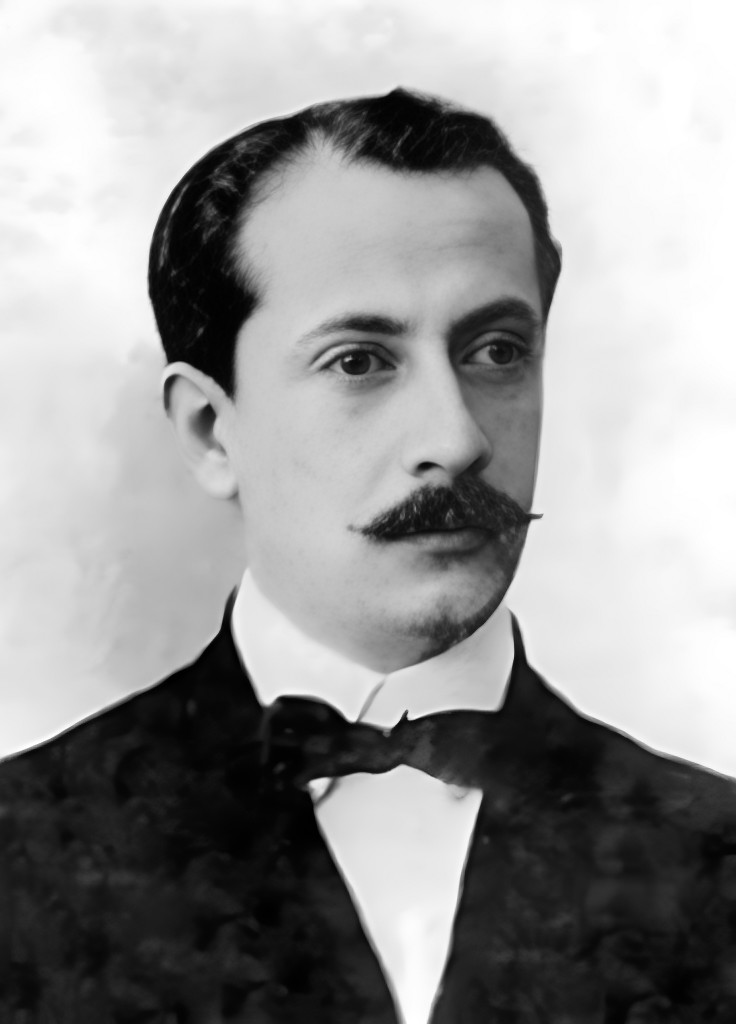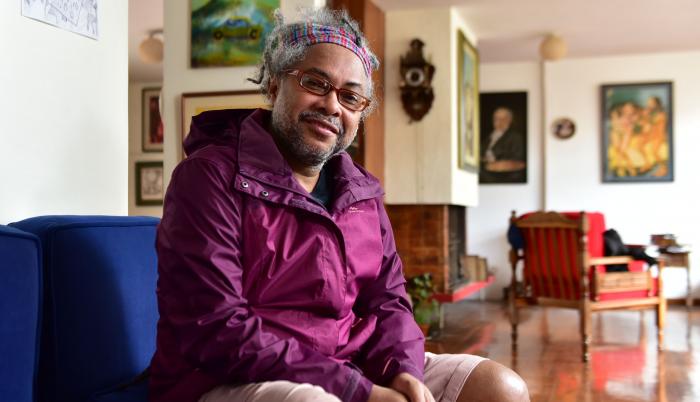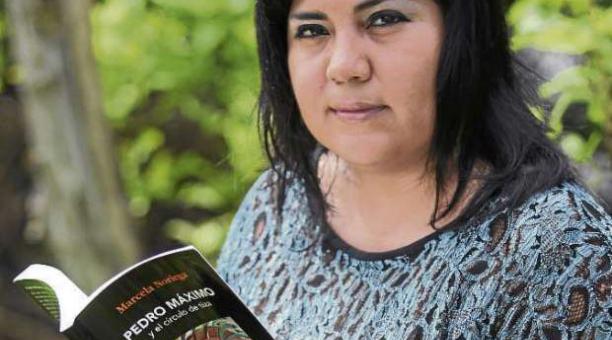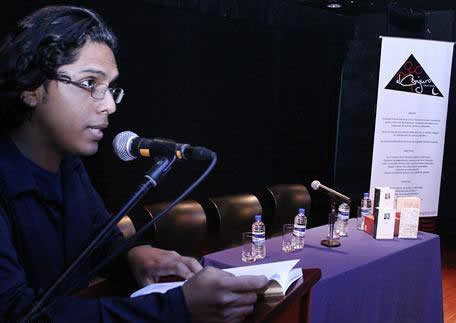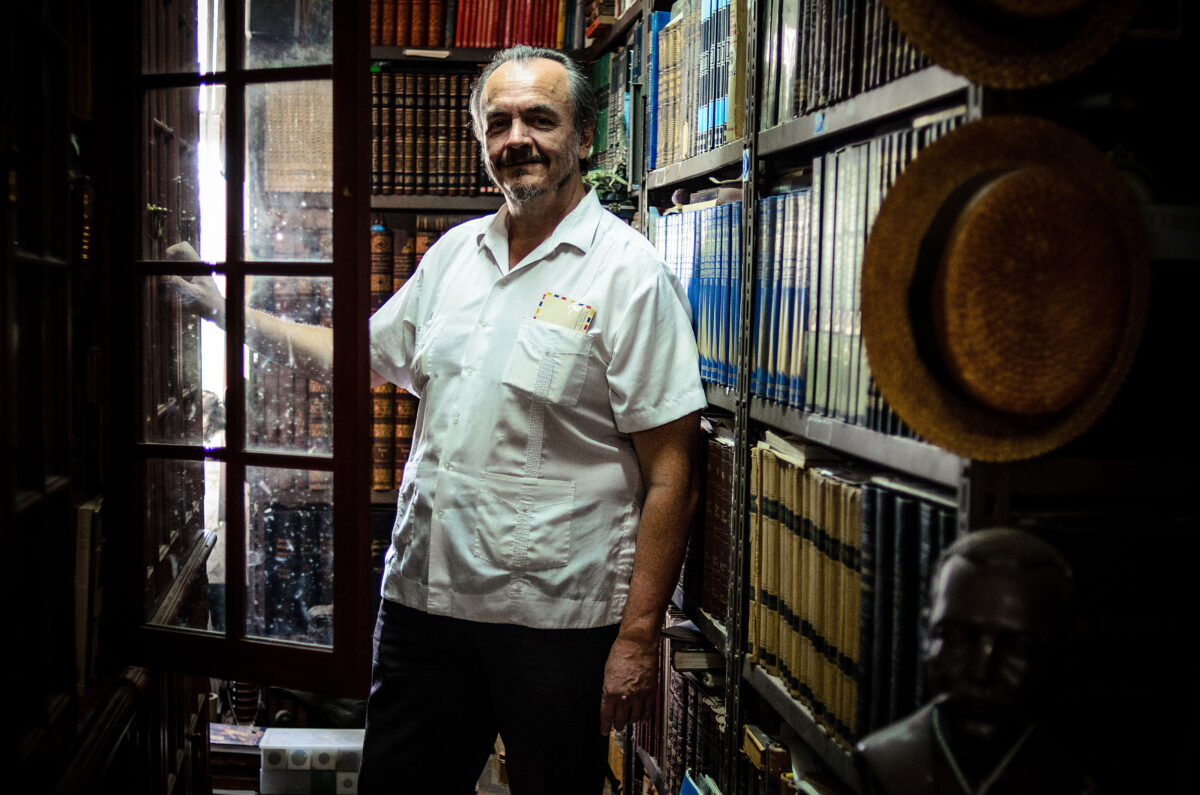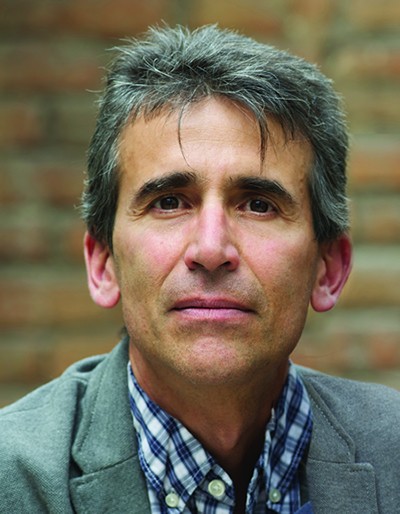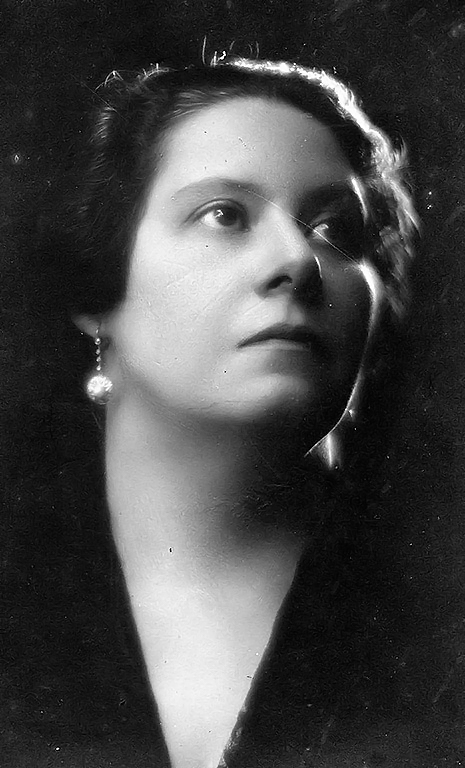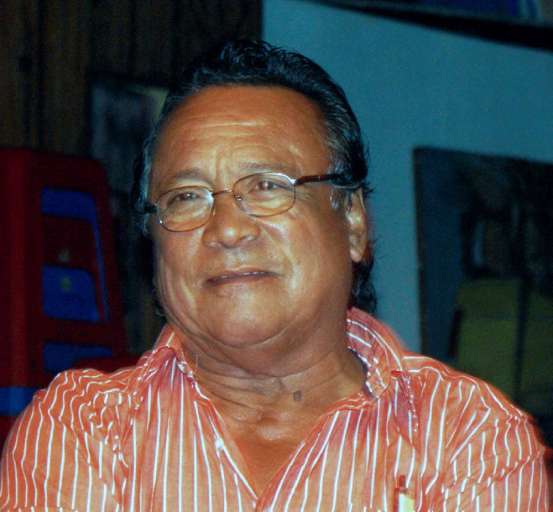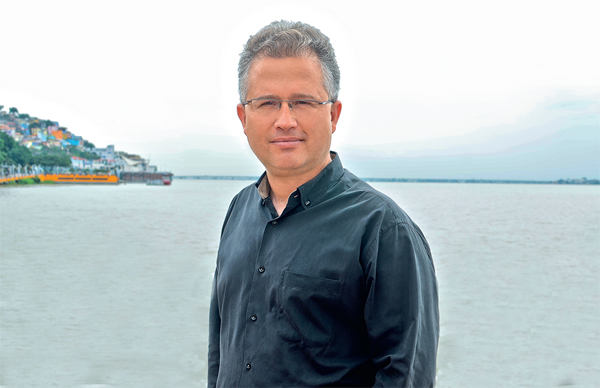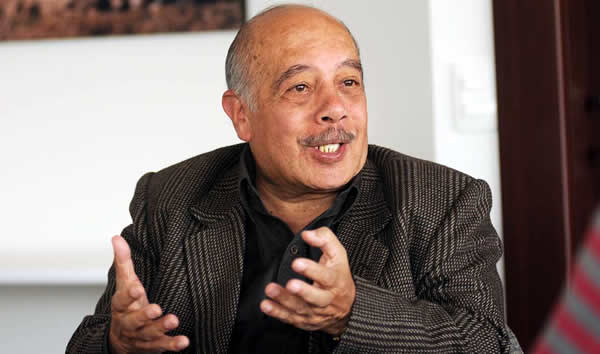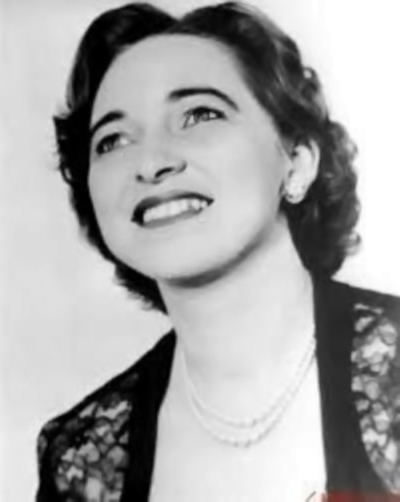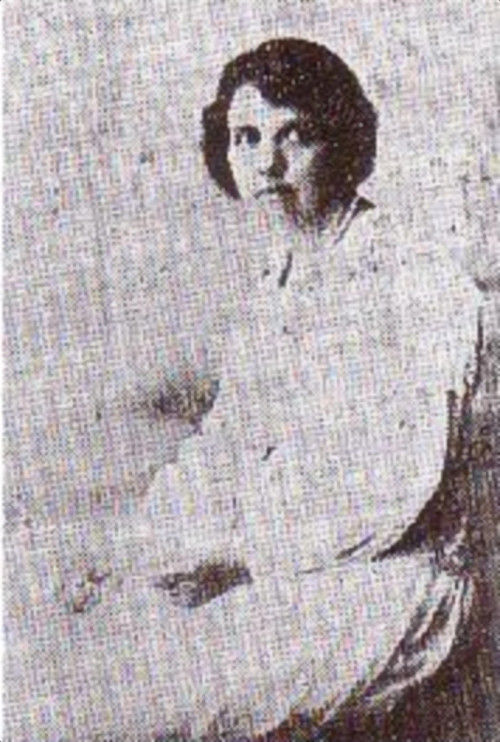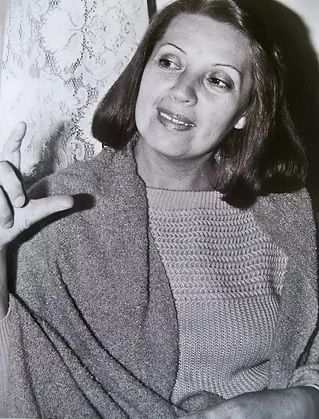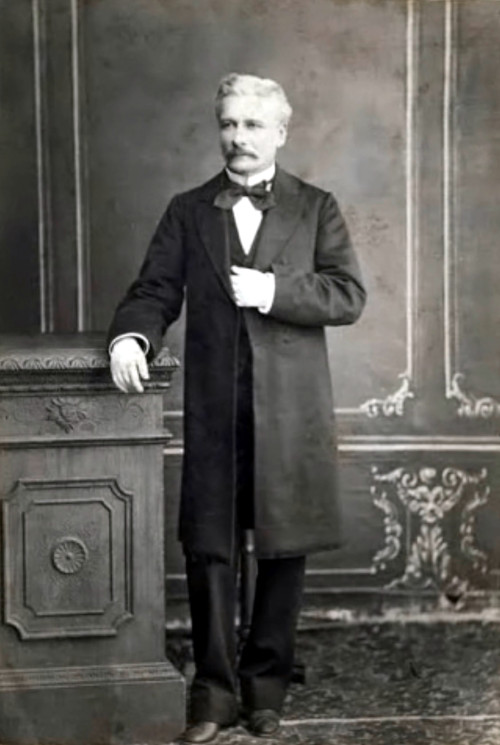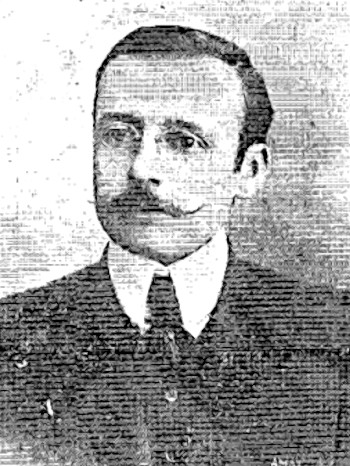Rafael Pino Roca (Guayaquil, October 24, 1878 – Guayaquil, 1963) was an Ecuadorian poet, playwright, and diplomat. Educated in Germany, he became fluent in multiple languages and developed a deep admiration for European culture. Pino Roca held key government roles, including Minister of War, Navy, and Aviation, where he helped establish Ecuador’s first aviation school. His literary works, notably the epic poem Canto a la Raza, gained wide acclaim. He also served as Ecuador’s Consul in Europe and was known for his controversial pro-German stance during the prelude to World War II.
Continue reading “Rafael Pino Roca”Category: Writers from Guayaquil
Francisco Santana
Francisco Santana Segura (Guayaquil, 1968) is an Afro-Ecuadorian novelist, short story writer and journalist. He has worked as a writer for the newspapers El Universo and El Telégrafo, and the magazines SoHo and Mundo Diners. His latest novel is La Piel es un Veneno (2020). His genre, often described as “dirty realism,” by critics delves deep into the gritty and unfiltered aspects of life, painting vivid pictures of reality.
Continue reading “Francisco Santana”Marcela Noriega
Marcela Noriega Rodríguez (Guayaquil, 1978) is an Ecuadorian writer, journalist and professor. She is the author of a novel, poetry books, and juvenile and children’s literature. At the age of 19, she won second place at the Biennial of Ecuadorian Poetry in Cuenca and in 2009 she won first place in the same contest with her book No hay que dar voces, published by the University of Cuenca, with support from the Ministry of Culture. She is the author of the novel Pedro Máximo y el círculo de tiza (2012).
Continue reading “Marcela Noriega”César Eduardo Galarza
César Eduardo Galarza (Guayaquil, Ecuador, 1981) is a poet, writer, cultural advisor, academic, radio presenter, and filmmaker. He was a member of the literary workshop of renowned Ecuadorian author Miguel Donoso Pareja from 1999 to 2007. Galarza debuted with Polvo fue su piel (2000), followed by contributions to Mensaje en una botella (2002) and Madera muerta (2008), which earned him recognition at the “Alfonso Carrasco Vintimilla” Ecuadorian Literature Meeting. In addition to his literary career, he has worked as a cultural advisor, and hosted a radio segment on cultural cinema.
Continue reading “César Eduardo Galarza”Melvin Hoyos Galarza
Melvin Hoyos Galarza (Guayaquil, January 9, 1956) is an Ecuadorian historian, architect, and cultural administrator known for his extensive contributions to preserving and promoting Guayaquil’s heritage. Since 1992, he has directed the Municipal Library of Guayaquil, where he oversaw the restoration of historic collections and revived the Boletín de la Biblioteca Municipal, a publication dormant for 80 years. In 2000, he was appointed Director of Guayaquil’s Department of Library, Museum, and Arts, where he transformed the city’s cultural institutions, notably founding the City’s Historical Museum. A distinguished member of the National Academy of History, Hoyos has authored significant works on Ecuadorian history, numismatics, and architecture, including La Moneda Ecuatoriana a Través de los Tiempos (The Ecuadorian Currency Through the Ages, 1998) and Guayaquil: Memorias Urbanas (Guayaquil: Urban Memories, 2007).
Continue reading “Melvin Hoyos Galarza”Adolfo Macias Huerta
Adolfo Macias Huerta (Guayaquil, 1960) is a renowned Ecuadorian novelist and psychotherapist. His significant contributions to contemporary literature have earned him critical acclaim and recognition. With works like “El Mitómano” (2018) and “Donde el sol pierde su reino” (2023), Macías Huerta showcases his talent for crafting compelling narratives that explore themes of art, pain, and the complexities of human existence. His ability to create captivating characters and challenge conventional storytelling boundaries has solidified his position as a notable figure in Ecuadorian literature, while his numerous awards, including the Joaquín Gallegos Lara Prize (1995, 2010) and the National Literature Prize (2017), highlight his literary prowess and literary impact.
Continue reading “Adolfo Macias Huerta”Rosa Borja de Ycaza
Rosa Borja de Ycaza (Guayaquil, July 30, 1889 – Guayaquil, December 22, 1964) was an Ecuadorian writer, essayist, playwright, sociologist, poet, feminist, and activist. A prominent figure in Ecuadorian intellectual circles, she was a passionate advocate for women’s rights and education, founding the Legión Femenina de Educación Popular and contributing to international feminist movements. She held several key cultural and political roles, including Director of the Centro de Estudios Literarios at the University of Guayaquil and president of the Ecuadorian branch of the Unión de Mujeres Americanas. Her literary works, including plays, poetry, and essays, reflect her deep commitment to social reform and gender equality.
Continue reading “Rosa Borja de Ycaza”Jorge Velasco Mackenzie
Jorge Velasco Mackenzie is an Ecuadorian novelist, short story writer, poet, playwright and professor. He was born in Guayaquil on January 16, 1949. In 1983, Velasco Mackenzie published his first (and most famous) novel El rincón de los justos. In 1986 he won the “Grupo de Guayaquil” Award for his novel about the Afro-Ecuadorian people, Tambores para una canción perdida. 1996 he won first place in the IV Biennial of the Ecuadorian Novel with his historical novel En nombre de un amor imaginario.
Continue reading “Jorge Velasco Mackenzie”Leonardo Valencia
Leonardo Valencia is an Ecuadorian novelist and short story writer. He was born in Guayaquil in 1969. He studied in Ecuador and Spain, where he obtained a degree in literary theory at the Autonomous University of Barcelona. He created the university’s writing program and ran it for several years. He currently lives in Quito where he teaches literature and creative writing at the Simon Bolivar Andean University. The literary critic Andrés Ortiz Lemos called Valencia’s latest novel, La escalera de Bramante (2019), “one of the most important novels written in the Spanish language in recent years.”
Continue reading “Leonardo Valencia”Humberto Vinueza
Humberto Vinueza Rodríguez was a writer and politician. He was born in Guayaquil in 1942 and died in Quito on March 15, 2017. During his lifetime, we published around 15 books, which earned him prestigious prizes such as the José Lezama Lima Prize (Cuba) and the Jorge Carrera Andrade Prize (Ecuador). He was part of the Tzantzismo literary movement of the 1960s Ecuador. In 1970 he published the book Un Gallinazo Cantor Bajo un sol de a perro. This book has been called a fundamental part of Ecuadorian poetry by writers such as Jorge Dávila Vázquez and Abdón Ubidia.
Continue reading “Humberto Vinueza”Carmen Acevedo Vega
Carmen Acevedo Vega de Idrobo (Guayaquil, July 16, 1913 – Guayaquil, April 28, 2006) was an eminent Ecuadorian poet, writer, and journalist whose literary career spanned several decades. Known for her profound and lyrical verses, Vega delved into themes of social justice, womanhood, and the human condition, making significant contributions to Ecuadorian literature and culture. Through her work in journalism and membership in various cultural and journalistic institutions, she played a pivotal role in the cultural landscape of Ecuador. Vega’s dedication to exploring complex social themes and her involvement in literary and cultural circles have cemented her legacy as a key figure in Ecuadorian literature.
Continue reading “Carmen Acevedo Vega”Elysa Ayala
Elysa Ayala González, sometimes spelled Elisa Ayala González (Guayaquil, 1879 – 1956) was an Ecuadorian writer and painter. She was Ecuador’s first fiction writer and the first woman to write stories about montubios, the poor and simple peasants from Ecuador’s coast. Because of the sexist and conservative climate in Ecuador at the time, Elysa’s early works appeared mostly in foreign magazines, such as Nubes Rosadas and Revista Argentina (Argentina), Sucesos and El Nacional (Chile), Adelante (Uruguay), Hero and Cosmos (Cuba), América (the United States), and La Voz de Valencia (Spain). In Ecuador, her stories appeared in La Ilustración and some other magazines. Being fluent in English and French, she translated some of her stories into these languages. It should be noted that part of her literary work remains unpublished, including a novel about the peasant class, which was her preferred motif.
Continue reading “Elysa Ayala”Violeta Luna
Morayma Violeta Luna Carrera is an Ecuadorian poet, essayist, journalist, literary critic, professor. She was born on February 24, 1943 in Guayaquil. She is a member of various organizations, including the Press Circle of Ecuador, the Society of Ecuadorian Writers, and the House of Ecuadorian Culture.
Numa Pompilio Llona
Numa Pompilio Llona (Guayaquil, March 5, 1832 – April 5, 1907) was an Ecuadorian poet, lawyer, journalist, educator, diplomat, and philosopher. He served as a diplomat abroad, in countries such as Spain, France, Italy and Colombia, during which time he formed friendships with famous authors such as Victor Hugo, George Sand and Alphonse de Lamartine. He served as the rector of the University of Guayaquil, and also as the director of the Municipal Museum and Library of Guayaquil. During his lifetime he was one of Ecuador’s most popular poets.
Continue reading “Numa Pompilio Llona”Joaquín Gallegos Del Campo
Joaquín Gallegos Del Campo was an Ecuadorian modernist poet, newspaper publisher, and liberal politician. He was the father of the legendary author Joaquín Gallegos Lara. He was born in Guayaquil, Ecuador on July 27, 1873. In 1894, he and his brother Emilio founded the liberal weekly newspaper El Cáustico. In 1896, he founded another liberal newspaper, América Modernista, which published many modernist poets of the era. On November, 20, 1910, while serving as Secretary-General of the Government of El Oro Province, he was killed by a stray bullet during a revolutionary riot gunfight when he looked out his office window from the government building to see what was happening. At the time of his death his only son was less than 2 years old. In 1912, his only book Mis recuerdos: poesías líricas y cuentos en prosa was published posthumously by his window Emma Lara Calderón.
Continue reading “Joaquín Gallegos Del Campo”
